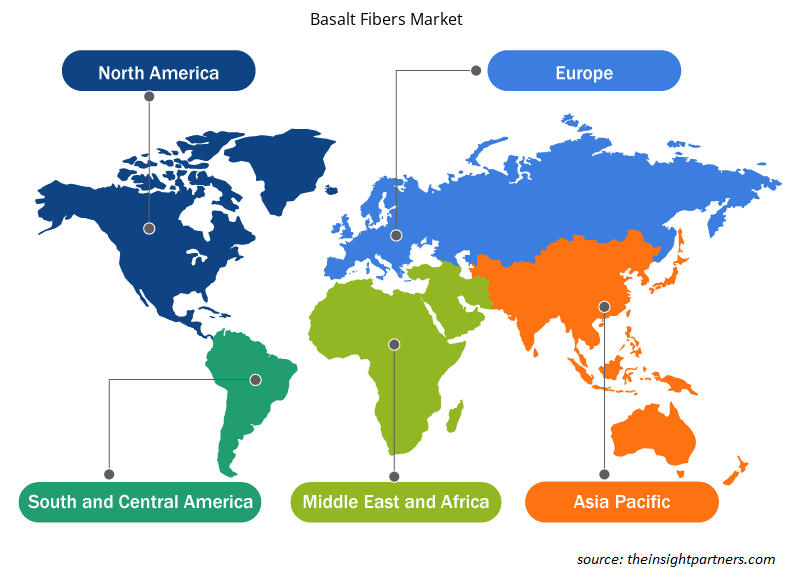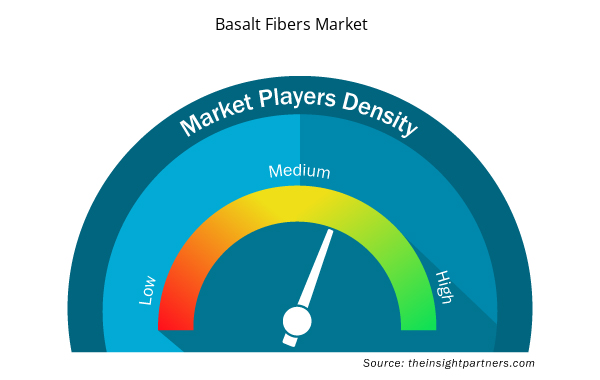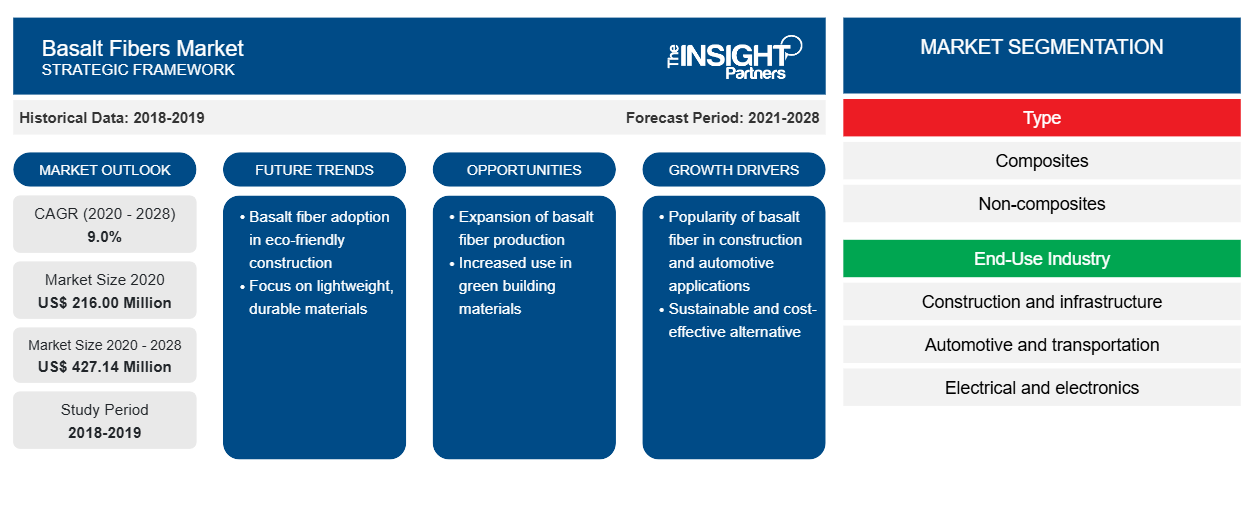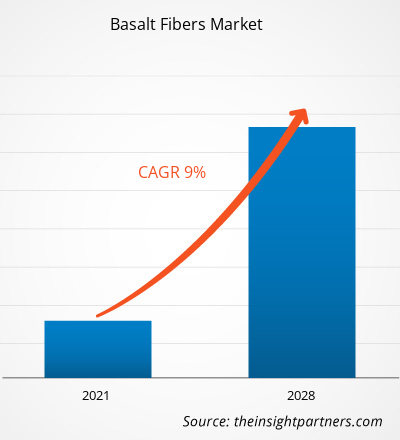El mercado de fibra de basalto se valoró en US$ 216,00 millones en 2020 y se proyecta que alcance los US$ 427,14 millones en 2028; se espera que registre una CAGR del 9,0% de 2021 a 2028.
La fibra de basalto posee propiedades químicas similares a las fibras de vidrio, pero tiene mejores propiedades fisicoquímicas que las fibras de vidrio. Se prevé que el mercado de la fibra de basalto experimente un alto crecimiento debido a su demanda por parte de industrias de uso final como la automotriz, la marina, la construcción y la electrónica. Es probable que el aumento de las actividades de construcción en varias regiones debido al crecimiento de la población, el aumento de los ingresos y las iniciativas gubernamentales en varias economías para desarrollar una mejor infraestructura impulse el crecimiento del mercado de la fibra de basalto. Sin embargo, las propiedades inconsistentes de la materia prima se encuentran entre los factores que restringen el crecimiento del mercado de la fibra de basalto .
En 2020, la región de Asia Pacífico representó la mayor participación en el mercado mundial de fibra de basalto. El continente de Asia Pacífico comprende varias economías en desarrollo y desarrolladas, como India, China, Japón, Corea del Sur y Australia. Los países emergentes están siendo testigos de un aumento en las actividades de industrialización y urbanización. Se prevé que el crecimiento de los proyectos de construcción en países como India y China y las crecientes inversiones en actividades de infraestructura, como la nueva construcción de carreteras, ferrocarriles, líneas de metro subterráneas y revestimientos de pavimento, impulsen el mercado de fibra de basalto en la región.
Personalice este informe según sus necesidades
Obtendrá personalización en cualquier informe, sin cargo, incluidas partes de este informe o análisis a nivel de país, paquete de datos de Excel, así como también grandes ofertas y descuentos para empresas emergentes y universidades.
- Obtenga las principales tendencias clave del mercado de este informe.Esta muestra GRATUITA incluirá análisis de datos, desde tendencias del mercado hasta estimaciones y pronósticos.
Impacto de la pandemia de COVID-19 en el mercado de la fibra de basalto
La pandemia actual ha alterado drásticamente el estado del sector químico y de materiales y ha afectado negativamente al crecimiento del mercado de fibra de basalto. La implementación de medidas para combatir la propagación del virus ha afectado al crecimiento de varios sectores industriales. Industrias como la construcción, la automoción, la química y la electrónica se han visto afectadas por la repentina distorsión de la eficiencia operativa y las interrupciones en las cadenas de valor atribuibles al cierre repentino de las fronteras nacionales e internacionales. La importante disminución del crecimiento de varios sectores industriales afectó gravemente a la demanda de fibras de basalto en el mercado mundial. Sin embargo, como las economías están planeando reactivar sus operaciones, se espera que la demanda de fibra de basalto aumente a nivel mundial. Se espera que la creciente demanda de fibras de basalto en diversas industrias como la construcción, la automoción, la química, la electrónica y la aeroespacial, junto con importantes inversiones de fabricantes destacados, impulsen el crecimiento de las fibras de basalto.
Perspectivas de mercado
Amplias aplicaciones de las fibras de basalto en diversas industrias de uso final para impulsar su crecimiento en el mercado
Las fibras de basalto tienen un amplio espectro de aplicaciones en diversas industrias de uso final, como la construcción, la automoción, la electricidad y la electrónica, la química, la aeroespacial y la marina. En la construcción, las hebras de basalto picadas se utilizan para aumentar la resistencia al agrietamiento de los paneles de cemento. Debido a la estabilidad química única de las fibras de basalto en condiciones extremas, se pueden utilizar en muchas estructuras de hormigón, como puentes, túneles, presas y suelos. Las fibras de basalto se utilizan en la industria química en la producción de tuberías resistentes a los productos químicos, revestimientos protectores, tanques de almacenamiento de líquidos corrosivos, fertilizantes químicos, ácidos, sustancias tóxicas, etc. A medida que se profundiza la aplicación de las fibras de basalto, la demanda del mercado de fibras de basalto aumenta a un ritmo más rápido.
Información sobre el producto
Según el producto, el mercado mundial de fibra de basalto se segmenta en roving, hebras cortadas, hilo retorcido, telas y cintas, entre otros. El segmento de roving tuvo la mayor participación en el mercado mundial de fibra de basalto en 2020. El roving de basalto es un haz de fibras de basalto complejas unidireccionales continuas. El roving tiene resistencia a entornos agresivos, alta resistencia natural, larga vida útil y propiedades superiores de aislamiento eléctrico. Según sus características técnicas, el roving de basalto supera al vidrio E y al vidrio S en numerosos aspectos. El roving de basalto es extremadamente resistente al calor y puede soportar temperaturas de hasta 1000 °C durante un corto período de tiempo.
Entre los principales actores que operan en el mercado global de fibra de basalto se encuentran Kamenny Vek Company, Fiberbas Construction and Building Technologies, Hydro Design Management Co. Pvt. Ltd., Hg Gbf Basalt Fiber Co., Ltd, Bastech, Mafic SA, Shanxi Basalt Fiber Technology Co. Ltd, Technobasalt-Invest LLC, Deutsche Basalt Faser Gmbh y Basalt Engineering LLC.
Informe Destacado
- Tendencias progresivas de la industria en el mercado de fibra de basalto para ayudar a los actores a desarrollar estrategias efectivas a largo plazo
- Estrategias de crecimiento empresarial adoptadas por los mercados desarrollados y en desarrollo
- Análisis cuantitativo del mercado de fibra de basalto de 2019 a 2028
- Estimación de la demanda mundial de fibra de basalto
- Análisis PEST para ilustrar la eficacia de los compradores y proveedores que operan en la industria
- Avances recientes para comprender el escenario competitivo del mercado
- Tendencias y perspectivas del mercado, así como factores que impulsan y restringen el crecimiento del mercado de fibra de basalto
- Asistencia en el proceso de toma de decisiones destacando las estrategias de mercado que sustentan el interés comercial y conducen al crecimiento del mercado.
- El tamaño del mercado de fibra de basalto en varios nodos
- Descripción detallada y segmentación del mercado, así como la dinámica de la industria de la fibra de basalto.
- Tamaño del mercado de fibra de basalto en varias regiones con prometedoras oportunidades de crecimiento
Perspectivas regionales del mercado de fibras de basalto
Los analistas de Insight Partners explicaron en detalle las tendencias y los factores regionales que influyen en el mercado de fibras de basalto durante el período de pronóstico. Esta sección también analiza los segmentos y la geografía del mercado de fibras de basalto en América del Norte, Europa, Asia Pacífico, Oriente Medio y África, y América del Sur y Central.

- Obtenga datos regionales específicos para el mercado de fibras de basalto
Alcance del informe de mercado de fibras de basalto
| Atributo del informe | Detalles |
|---|---|
| Tamaño del mercado en 2020 | US$ 216,00 millones |
| Tamaño del mercado en 2028 | US$ 427,14 millones |
| Tasa de crecimiento anual compuesta (CAGR) global (2020-2028) | 9.0% |
| Datos históricos | 2018-2019 |
| Período de pronóstico | 2021-2028 |
| Segmentos cubiertos | Por tipo
|
| Regiones y países cubiertos | América del norte
|
| Líderes del mercado y perfiles de empresas clave |
|
Densidad de actores del mercado: comprensión de su impacto en la dinámica empresarial
El mercado de fibras de basalto está creciendo rápidamente, impulsado por la creciente demanda de los usuarios finales debido a factores como la evolución de las preferencias de los consumidores, los avances tecnológicos y una mayor conciencia de los beneficios del producto. A medida que aumenta la demanda, las empresas amplían sus ofertas, innovan para satisfacer las necesidades de los consumidores y aprovechan las tendencias emergentes, lo que impulsa aún más el crecimiento del mercado.
La densidad de actores del mercado se refiere a la distribución de las empresas o firmas que operan dentro de un mercado o industria en particular. Indica cuántos competidores (actores del mercado) están presentes en un espacio de mercado determinado en relación con su tamaño o valor total de mercado.
Las principales empresas que operan en el mercado de fibras de basalto son:
- Compañía Kamenny Vek
- Tecnologías de construcción y edificación Fiberbas
- Compañía de gestión de diseño hidráulico Pvt. Ltd.
- Fibra de basalto Hg Gbf Co., Ltd.
- Bastech
Descargo de responsabilidad : Las empresas enumeradas anteriormente no están clasificadas en ningún orden particular.

- Obtenga una descripción general de los principales actores clave del mercado de fibras de basalto
Mercado mundial de fibra de basalto
Por producto
- Errabundo
- Hebra picada
- Hilo retorcido
- Telas y cintas
- Otros
Por industria de uso final
- Construcción
- Automotor
- Electricidad y electrónica
- Químico
- Otros
Perfiles de empresas
- Compañía Kamenny Vek
- Tecnologías de construcción y edificación Fiberbas
- Compañía de gestión de diseño hidráulico Pvt. Ltd.
- Fibra de basalto Hg Gbf Co., Ltd.
- Bastech
- Mafic SA
- Tecnología de fibra de basalto de Shanxi Co. Ltd.
- Technobasalt-Invest LLC
- Fibra de basalto alemana Gmbh
- Ingeniería de basalto sl
- Análisis histórico (2 años), año base, pronóstico (7 años) con CAGR
- Análisis PEST y FODA
- Tamaño del mercado Valor/volumen: global, regional, nacional
- Industria y panorama competitivo
- Conjunto de datos de Excel



Report Coverage
Revenue forecast, Company Analysis, Industry landscape, Growth factors, and Trends

Segment Covered
This text is related
to segments covered.

Regional Scope
North America, Europe, Asia Pacific, Middle East & Africa, South & Central America

Country Scope
This text is related
to country scope.
Preguntas frecuentes
Asia-Pacific is estimated to register the fastest CAGR in the market over the forecast period. Asia Pacific comprises several economies such as India, China, Japan, South Korea, and Australia. These countries are witnessing an upsurge in industrialization and urbanization activities, offering ample opportunities for the key market players in the basalt fiber market. In Asia Pacific, there has been an increase in the consumption of basalt fiber in various industries, such as wind energy, construction & infrastructure, electrical & electronics, and automotive. Along with this, the rise in awareness regarding sustainable living and environment-friendly materials used in the application of infrastructure, aerospace, and other industries boosts the demand for basalt fibers in the region. Features of basalt fiber such as low cost, easy availability, and increasing production capacities bolster the growth of the basalt fiber market in Asia Pacific.
Based on end-use industry, automotive segment led the global basalt fiber market during the forecasted period. Basalt fiber has various properties such as high mechanical strength, resistance to high temperature, durability, and chemical resistance. It is also environmentally friendly. Such properties make basalt fiber an ideal material to be used in the automotive industry to produce headliners, CNG cylinders, brake pads and clutch plates, thermo insulation for exhaust systems, muffler’s filler, interior and exterior parts, and thermoplastic parts. Basalt fiber is lighter than steel. The fiber has high mechanical strength and an extended range of working temperatures. It is cost-effective along with excellent recyclability. All these properties made basalt fiber one of the ideal materials to be used to produce CNG cylinders.
On the basis of end-use industry, construction segment is leading the basalt fiber market during the forecast period. Basalt fibers are primarily employed in the construction industry as it has a higher strength than steel and is resistant to electromagnetic radiations and ultraviolet rays. Basalt fiber is three times lighter than steel and is 2.5 times stronger in tensile strength than steel. It also has an extremely lower coefficient of heat conductivity than steel, which improves energy efficiency. In the construction industry, basalt fiber is used in various applications, such as in the usage of wet or dry chopped strand for premix technology, basalt roving for spray up and shotcrete technologies, high strength roving for the manufacturing of rebars and pultruded profiles, and basalt fiber fabrics for concrete reinforcement and building thermo insulation.
Based on product, fabrics and tapes segment is expected to grow at the fastest CAGR from 2021 to 2028. Basalt woven and knitted fabrics are mostly manufactured from direct roving, twisted yarns, special weaving, and knitting machines. Basalt fabrics are generally used for producing structural-basalt plastics, which are based on various thermosetting binders. It can also be used as a base when manufacturing soft and rigid roofing as well as for electrotechnical purposes to produce insulation materials. The basalt fiber tapes are used with resin and are compatible with polyester, epoxy, and vinyl ester. These tapes are used for the selective reinforcement of laminates, sleeve or pipe winding, seams, and molding. The finished edges of the basalt fiber provide easy handling and a clean, finished appearance, which prevents the tape from unraveling.
The major players operating in the basalt fiber market are Kamenny Vek Company, Fiberbas Construction and Building Technologies, Hydro Design Management Co. Pvt. Ltd., Hg Gbf Basalt Fiber Co., Ltd., Bastech, Mafic SA, Shanxi Basalt Fiber Technology Co. Ltd., Technobasalt-Invest LLC, Deutsche Basalt Faser Gmbh, and Basalt Engineering LLC.
In 2020, Asia-Pacific held the largest revenue share of the global basalt fiber market. Asia-Pacific continent comprises several developing and developed economies such as India, China, Japan, South Korea, and Australia. These emerging countries are witnessing an upsurge in industrialization and urbanization activities, offering ample opportunities for the key market players in the basalt fiber market. Asia-Pacific region is anticipated to propel the basalt fiber demand owing to the presence of several domestic players in the vertical market segment such as construction and automotive. The basalt fiber market is expected to witness huge demand from the construction and automotive industries due to their resistance power to varying temperatures and chemicals, low water absorption, high mechanical strength, and durability. Besides, basalt fiber finds applications in marine, aerospace & defense, and others. The basalt fiber market is expected to rise during the projection period due to enormous growth in the automotive sector especially in countries including India and China. Additionally, the rising urbanization, rising population, and the presence of government support are the other drivers for the market growth in the region.
Trends and growth analysis reports related to Chemicals and Materials : READ MORE..
The List of Companies - Basalt Fiber Market
- Kamenny Vek Company
- Fiberbas Construction and Building Technologies
- Hydro Design Management Co. Pvt. Ltd.
- Hg Gbf Basalt Fiber Co., Ltd
- Bastech
- Mafic SA
- Shanxi Basalt Fiber Technology Co. Ltd
- Technobasalt-Invest LLC
- Deutsche Basalt Faser Gmbh
- Basalt Engineering LLC
The Insight Partners performs research in 4 major stages: Data Collection & Secondary Research, Primary Research, Data Analysis and Data Triangulation & Final Review.
- Data Collection and Secondary Research:
As a market research and consulting firm operating from a decade, we have published and advised several client across the globe. First step for any study will start with an assessment of currently available data and insights from existing reports. Further, historical and current market information is collected from Investor Presentations, Annual Reports, SEC Filings, etc., and other information related to company’s performance and market positioning are gathered from Paid Databases (Factiva, Hoovers, and Reuters) and various other publications available in public domain.
Several associations trade associates, technical forums, institutes, societies and organization are accessed to gain technical as well as market related insights through their publications such as research papers, blogs and press releases related to the studies are referred to get cues about the market. Further, white papers, journals, magazines, and other news articles published in last 3 years are scrutinized and analyzed to understand the current market trends.
- Primary Research:
The primarily interview analysis comprise of data obtained from industry participants interview and answers to survey questions gathered by in-house primary team.
For primary research, interviews are conducted with industry experts/CEOs/Marketing Managers/VPs/Subject Matter Experts from both demand and supply side to get a 360-degree view of the market. The primary team conducts several interviews based on the complexity of the markets to understand the various market trends and dynamics which makes research more credible and precise.
A typical research interview fulfils the following functions:
- Provides first-hand information on the market size, market trends, growth trends, competitive landscape, and outlook
- Validates and strengthens in-house secondary research findings
- Develops the analysis team’s expertise and market understanding
Primary research involves email interactions and telephone interviews for each market, category, segment, and sub-segment across geographies. The participants who typically take part in such a process include, but are not limited to:
- Industry participants: VPs, business development managers, market intelligence managers and national sales managers
- Outside experts: Valuation experts, research analysts and key opinion leaders specializing in the electronics and semiconductor industry.
Below is the breakup of our primary respondents by company, designation, and region:

Once we receive the confirmation from primary research sources or primary respondents, we finalize the base year market estimation and forecast the data as per the macroeconomic and microeconomic factors assessed during data collection.
- Data Analysis:
Once data is validated through both secondary as well as primary respondents, we finalize the market estimations by hypothesis formulation and factor analysis at regional and country level.
- Macro-Economic Factor Analysis:
We analyse macroeconomic indicators such the gross domestic product (GDP), increase in the demand for goods and services across industries, technological advancement, regional economic growth, governmental policies, the influence of COVID-19, PEST analysis, and other aspects. This analysis aids in setting benchmarks for various nations/regions and approximating market splits. Additionally, the general trend of the aforementioned components aid in determining the market's development possibilities.
- Country Level Data:
Various factors that are especially aligned to the country are taken into account to determine the market size for a certain area and country, including the presence of vendors, such as headquarters and offices, the country's GDP, demand patterns, and industry growth. To comprehend the market dynamics for the nation, a number of growth variables, inhibitors, application areas, and current market trends are researched. The aforementioned elements aid in determining the country's overall market's growth potential.
- Company Profile:
The “Table of Contents” is formulated by listing and analyzing more than 25 - 30 companies operating in the market ecosystem across geographies. However, we profile only 10 companies as a standard practice in our syndicate reports. These 10 companies comprise leading, emerging, and regional players. Nonetheless, our analysis is not restricted to the 10 listed companies, we also analyze other companies present in the market to develop a holistic view and understand the prevailing trends. The “Company Profiles” section in the report covers key facts, business description, products & services, financial information, SWOT analysis, and key developments. The financial information presented is extracted from the annual reports and official documents of the publicly listed companies. Upon collecting the information for the sections of respective companies, we verify them via various primary sources and then compile the data in respective company profiles. The company level information helps us in deriving the base number as well as in forecasting the market size.
- Developing Base Number:
Aggregation of sales statistics (2020-2022) and macro-economic factor, and other secondary and primary research insights are utilized to arrive at base number and related market shares for 2022. The data gaps are identified in this step and relevant market data is analyzed, collected from paid primary interviews or databases. On finalizing the base year market size, forecasts are developed on the basis of macro-economic, industry and market growth factors and company level analysis.
- Data Triangulation and Final Review:
The market findings and base year market size calculations are validated from supply as well as demand side. Demand side validations are based on macro-economic factor analysis and benchmarks for respective regions and countries. In case of supply side validations, revenues of major companies are estimated (in case not available) based on industry benchmark, approximate number of employees, product portfolio, and primary interviews revenues are gathered. Further revenue from target product/service segment is assessed to avoid overshooting of market statistics. In case of heavy deviations between supply and demand side values, all thes steps are repeated to achieve synchronization.
We follow an iterative model, wherein we share our research findings with Subject Matter Experts (SME’s) and Key Opinion Leaders (KOLs) until consensus view of the market is not formulated – this model negates any drastic deviation in the opinions of experts. Only validated and universally acceptable research findings are quoted in our reports.
We have important check points that we use to validate our research findings – which we call – data triangulation, where we validate the information, we generate from secondary sources with primary interviews and then we re-validate with our internal data bases and Subject matter experts. This comprehensive model enables us to deliver high quality, reliable data in shortest possible time.


 Obtenga una muestra gratuita de este informe
Obtenga una muestra gratuita de este informe